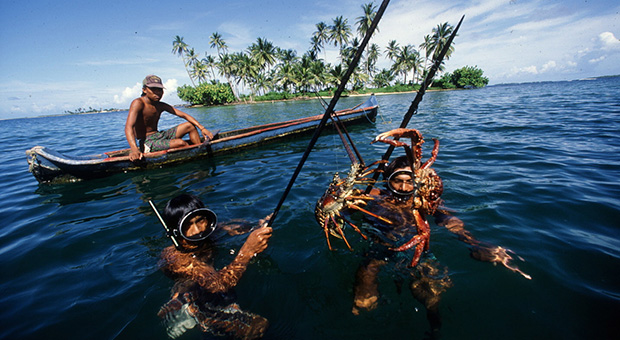GEORGE’S, Grenada — The Caribbean Community (CARICOM) Council on Trade and economic Development (COTED) will meet in April next year to discuss recommendations from a regional workshop urging the promotion of blue growth.
The workshop is now underway here and Agriculture, Lands, Forestry, Fisheries and the Environment Minister Roland Bhola, urged participants to promote blue growth by raising public awareness of the concept.
The concept of a “blue economy” emphasizes conservation and sustainable management, based on the premise that healthy ocean ecosystems are more productive and a must for sustainable ocean-based economies.
The participants were told that promoting the blue economy is for the greater good of the Caribbean, since there is need to sustainably manage the resources of the marine and maritime zones.
“There is need to change the thought process to find solutions to overcome the challenges in the fisheries sector, through understanding the importance to sustainable management of the region’s resources,” said Bhola as he spoke on the theme “Investing in Blue Economic Growth”.
He urged participants to deliver sound recommendations for the way forward on a strategy for sustainable blue growth in the region, noting that CPTED will meet in April 2015 and recommendations from the workshop will assist to optimize the benefits of blue growth in the region.
“The world we live in is vastly different, and we must create an enabling environment to improve our social and economic status while considering the challenges, need to include effective fisheries management resources, climate change and variability, cooperation at the other level and conventions,” Bhola said.
He pointed out that is a small island developing state with a vulnerable economy.
He said the management of the sea space is critical since the country’s maritime space is 70 times that of its land space.
“…the government has been expanding on the opportunities of its exclusive economic zone that includes the demand for tuna and other pelagic resources including the tourism sector,” Bhola said
Executive director of the Caribbean Regional Fisheries Mechanism (CRFM), Milton Haughton, also urged stakeholders to support the development of the region’s fisheries sector, both for food consumption and economic benefit.
“Globally the aquaculture sector is being developed to generate economic growth from the living resources in the oceans and seas. The Caribbean has to collaborate to meet the demands of the sector for economic growth within a sustainable context,” Haughton said.
He outlined the major components of the Blue Growth concept that includes optimizing human social and economic benefits from marine and inland capture fisheries, aquaculture development, food systems, and ecosystem services and marine biodiversity conservation at regional and national levels.
The workshop also allows continued efforts by the CRFM for enhanced involvement of all stakeholders in the policy process and improved, broad public understanding and appreciation of the challenges and opportunities of the industry and its policies, and what this means for investing in blue growth.
Chris Addison, senior programme coordinator, Technical Centre for Agricultural and Rural Cooperation (CTA) ACP-EU said CTA is committed to strengthening the value chains in the Caribbean and will continue to provide technical support towards smart agriculture, including fisheries.
Mitchell Lay, coordinator, Caribbean Network for Fisherfolk Organisations (CNFO), said while the workshop is also focused on building capacity of fisherfolks, there is need for marine affairs programmes to be part of the education system in schools at an early level to build on the knowledge platform of food and nutrition resources.
But Grenada’s Chief Fisheries Officer, Justin Rennie, said that in general the fisheries sector is not understood by the public and does not get the requisite attention from governments.
“This situation should be reviewed since the marine space in most countries is more than 50 times the size of land space, and is providing significant opportunities for the sector and the region holistically,” he said.
The workshop, organised by the CRFM in collaboration with CNFO under the support of CTA (ACP-EU), brings together stakeholders from the fisheries sector including media to deepen their understanding of the “blue growth concept” by raising public awareness in the Caribbean by deepening knowledge and capacity of primary industry stakeholders for more effective stakeholder positioning and participation in fisheries policy and management actions.







I don’t have a clue what they are talking about. Hope someone would come down to earth and explain how fisher people can participate in this blue growth.